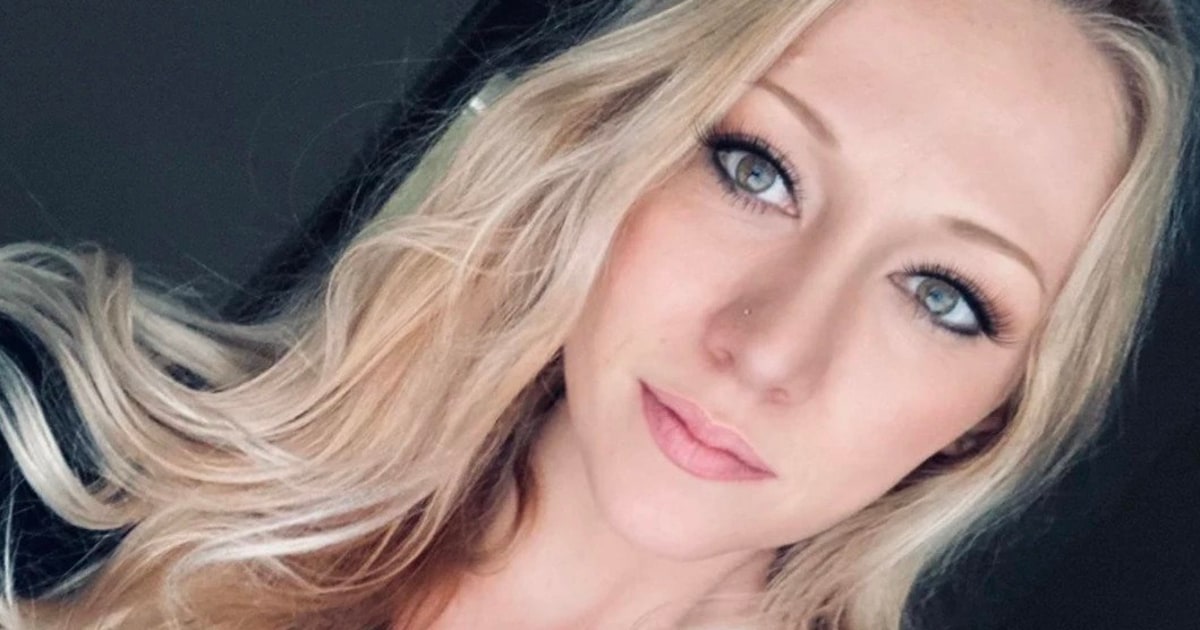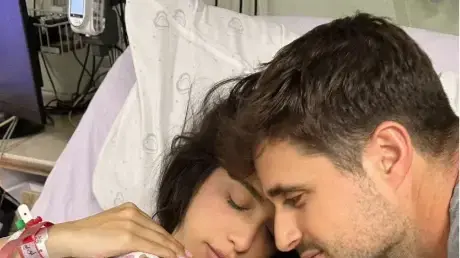By Danielle Campoamor -
Today
There is a stark reality in the United States: Some 58,000 pregnant people are incarcerated each year, according to statistics from the Johns Hopkins University School of Medicine.
The experience of giving birth in jail —where minor crimes are awaited trial or paid— or in prison —where serious crimes are served— varies greatly.
However, both "have in common
isolation, lack of decision-making power over childbirth, little time to spend with the newborn,
and the inability to breastfeed or provide breast milk," according to Dr. Carolyn Sufrin, a gynecologist. and obstetrician, who teaches at Johns Hopkins School of Medicine and has written on the subject.
Didn't know she was pregnant when she went to prison
Hayley Rider, a 28-year-old mother who gave birth while serving time, says she did not know she was pregnant when she arrived at Lee Arrendale State Prison outside Atlanta, Georgia, in January 2021.
She had been sentenced to two years in prison and eight years probation for a nonviolent drug-related offense.
Prison staff discovered that she was pregnant during a routine medical examination.
Hayley Rider was already the mother of two daughters when she found out she was pregnant in prisonHayley Rider via Today
“I was in a state of shock,” says Rider, who says she was not immediately informed that she was pregnant, but that she was being sent to another prison.
“(Lee Arrendale) is a pretty dangerous prison, very intense,” explains Rider.
"Pregnant female offenders are not allowed to be there for security reasons."
They transferred her to a smaller prison in Georgia.
"It was a dark time"
The woman says she craved information about her pregnancy, but "didn't have access to anything" except a dictionary.
She wasn't even told her due date until she was 22 weeks.
“You want to know that everything is going well.
In prison I did not have that peace of mind, ”she says.
The conditions of his imprisonment only increased his anxiety, especially at mealtimes.
"Everyone knows that prison food stinks, but it's especially bad when you're pregnant," she says.
"It is not the type of diet that would be desired for any pregnant woman."
Hayley Rider pictured with her three daughters.Hayley Rider via Today
In the prison I had a metal bed, a mattress about 3.5 inches (5 cm) thick, a sheet, and a blanket.
He did not provide pillows, but an additional mat.
“I remember my hips creaking late in pregnancy,” Rider says.
"I guess I didn't get much sleep those last three months."
Although Rider says he had a great support system outside the prison walls, "even the good days were overshadowed by isolation and punishment...
It was a dark time."
TODAY.com has reached out to a prison spokesperson for comment on the conditions Rider says she experienced while pregnant, but has not received a response prior to publication of this story.
"Say Goodbye Baby"
When Rider realized she was going into labor one night, she hesitated to tell anyone.
“It meant saying goodbye (to the baby),” he says.
After alerting staff, a nurse asked Rider if she was sure she was in labor.
She recounts that she told him no, not because she had doubts but because she, she says, "she wanted one last night" with her baby.
The next morning, I had contractions that were 2 minutes and 30 seconds long-
“I got into the back of a prison van in prison clothes and was taken to Atlanta Medical Center,” Rider says.
"The nurses treated me kindly, not like a recluse, and they didn't have to handcuff me."
Hayley Rider pictured with her partner and their third daughter.Hayley Rider via Today
In 2019, the Georgia Dignity Act went into effect, which, among other things, prohibits the use of shackles during childbirth.
Rider says that she considers herself lucky.
More than a dozen states still allow pregnant inmates to be restrained during labor
, according to The American College of Obstetricians and Gynecologists.
Rider's labor was quick, she says, but she was in no rush to deliver.
“I know it will sound crazy,” he
adds.
“Although I was in a lot of pain, I knew that we were parting ways there.”
After 16 hours of labor without medication and 45 minutes of pushing, Rider delivered her daughter at 4:36 am.
“There was an armed guard at the end of my bed, with a 360-degree view of everything you don't want anyone to see,” says Rider.
"But my baby was healthy and that distracted me for a while."
Rider was not allowed to call friends, family or the father of her daughter to tell them she was going to give birth.
“She was alone, apart from an armed officer,” she recalls.
"I had never seen her in my life, but she was the one who saw my baby born."
The mother says that after her baby was put to the breast, she was “waiting for them to take her away”.
[A report reveals that the states with the most restrictions on abortion suffer the highest maternal and infant mortality]
“Meeting your daughter for the first time is a once in a lifetime feeling.
Having a baby while incarcerated completely takes it away from you,” she says.
"I couldn't even think about her little face, her little hands, her skin or how good she felt in my arms: I knew they would come to force me to give her up."
The center's policy was to give moms two hours with their newborn and then—if a longer hospital stay is required—three hours of visiting every 24 hours.
Due to the pandemic, Rider was given three days with his daughter.
The youngest months after birth.Hayley Rider via Today
No one told the woman when they planned to take the baby, she says, but three days later two officers arrived that she recognized.
It was time to say goodbye to her.
“They forced me to put her in a crib and took her down the hall,” Rider says.
“I asked where she was going and who was going to take care of her, but they told me they didn't let me know.”
Rider was transferred back to Lee Arrendale State Prison, where she had been sent before learning she was pregnant.
The only thing she carried with her were menstrual pads.
The "most traumatic and darkest days of my life"
Rider says that it wasn't until her baby was almost a week old that her partner, Patrick, received a call from the hospital informing him of the birth of their daughter.
“They sent her home with a packet of baby instructions, made her sign a piece of paper, and left,” she explains.
Rider still doesn't know where his daughter was or who was taking care of her before Patrick took her home.
Corrections officials did not respond to a request for comment on these allegations.
The mother of three daughters returned to Lee Arrendale State Prison bleeding, milk oozing from her breasts and missing her baby.
“My uterus hurt,” Rider explains.
“She took my breast milk and poured it into a fungus-infected sink.
She was devastated”.
“I didn't have the supplies I needed.
He was unsanitary.
He was disgusting,” he adds.
“They were the most traumatic and darkest days of my life.
It was as bad as it sounds, being three days postpartum and sharing a bathroom with 75 people during the day and 25 people at night."
[This mother shares a photo showing the trauma of her childbirth that goes viral]
Rider did not tell any of her cellmates that she had just given birth because if they found out, she says, she would be "perceived as weak" and "would have been in danger."
The American Academy of Pediatrics recommends prolonging breastfeeding for up to 2 years.
July 4, 202201:40
Rider connected with a Georgia nonprofit called Motherhood Beyond Bars, which offers pregnancy and postpartum support to incarcerated people.
With the organization's help, she petitioned the parole board for early release.
The mother of three children returned home, after serving about 10 months in prison.
"I was very lost"
Once home, Rider says that everything was overwhelming at first, including going to the grocery store.
When she was in prison, her two eldest daughters stayed with family members and visited her regularly on weekends.
Over time, the visits increased and she Rider learned to be the mother of three daughters.
“It took me a lot of work,” he says.
She and her partner bought her first house in July 2022 and also bought a car.
“We don't have a dog yet,” she jokes.
"But things are going very well."
Rider is also two years sober and works as an assistant for the Motherhood Beyond Bars program, the same organization that she says "brought her back to life."



/cloudfront-eu-central-1.images.arcpublishing.com/prisa/72V5ILYZORGNLHVFBL5EFHNU6Q)




